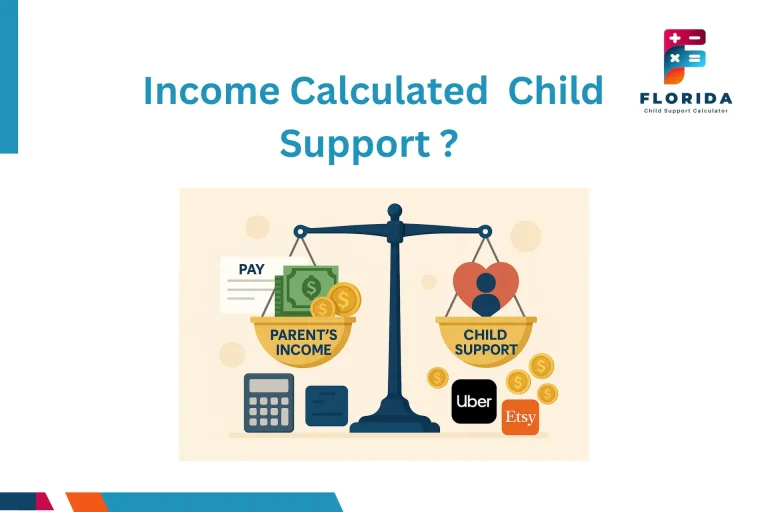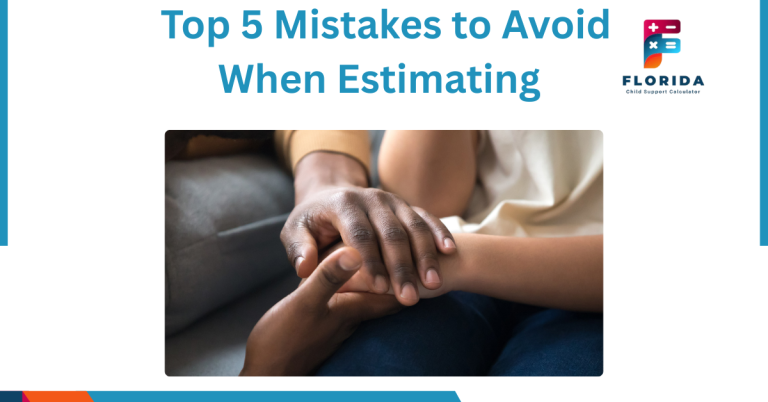How Is Child Support Calculated in Florida?
How child support is calculated in Florida might sound tricky, but don’t worry, we’ll make it easy to understand. If you’re a parent living in Florida and going through a divorce or separation, knowing how much support to expect or pay is super important. Florida has a special formula that helps the court decide the right amount.
It looks at things like income, who the child lives with, and extra costs like daycare or health insurance. In this guide, you’ll learn how it all works, what affects the final number, and what to do if things change. Let’s break it down step by step, no lawyer talk, just clear answers.

What Formula Does Florida Use for Child Support?
Florida doesn’t just guess a number. It uses something called the Income Shares Model. Imagine this: if you and the other parent still lived together, you’d both share the cost of raising your child. That’s the goal here: split the bill fairly.
The court adds up both of your incomes. Then it checks a chart to see how much money your child should get each month. That total is then split between you based on how much each of you earns. It’s kind of like splitting a pizza based on how much each person brought to the party.
If one parent makes a lot more, they usually pay more. And if you both earn the same? Then the amount is shared more evenly.
How Does Income Affect Child Support in Florida?
Florida looks at your net income, which means your money after taxes and allowed deductions. Here’s what counts as income:
- Your paycheck from work
- Bonuses or overtime
- Unemployment or disability checks
- Rent money if you own property
- Business or freelance income
And here’s what they subtract:
- Taxes
- Health insurance you pay for yourself
- Other court-ordered child support or alimony
Let’s say you make $4,000/month after taxes, and your co-parent makes $2,000/month. That’s $6,000 total. You make two-thirds of the income, so you’re responsible for about two-thirds of the child support amount.
Simple math, but big impact!
How Does Florida Handle Child Support for Self-Employed Parents?
Being your own boss doesn’t mean skipping child support. If you’re self-employed in Florida, the court might take an even closer look at your income. Why? Because it’s easier to hide money when you don’t get a regular paycheck.
Florida still uses your net income to calculate child support. But here’s the twist: if you run a business, the court checks your tax returns, business expenses, and lifestyle. For example:
Let’s say you report $30,000 on your taxes, but you drive a BMW and live in a beach house. The court might think something’s fishy and “impute income”, meaning, they’ll guess what you should be making based on your skills, past earnings, and industry.
What to keep in mind:
- Keep clean records: receipts, invoices, and bank statements
- Don’t over-report business expenses to lower your income
- Be honest, courts have seen every trick in the book
Whether you’re a freelancer, Uber driver, or run a bakery, Florida still expects you to support your child based on what you realistically earn, or could earn.
Does Parenting Time Reduce Child Support in Florida?
Yes, it can. And here’s the magic number: 73 nights.
If your child sleeps at your house for at least 73 nights a year, Florida sees that as shared parenting. That means your child support may go down. The more time you spend with your child overnight, the more money you’re already spending on food, clothes, bedtime stories, all of it.
But don’t assume 50/50 time means no support. If you earn more than the other parent, you’ll probably still pay something. Why? Because the goal is to make sure your child lives well in both homes, not just the one with the higher paycheck.
Florida Child Support Guidelines Chart 2024, 2025
Florida uses a special chart to figure out how much child support should be paid. This chart shows amounts based on how much money both parents make and how many kids you have. Here’s a quick example:
| Combined Net Income | 1 Child | 2 Children |
| $3,000/month | $686 | $1,119 |
| $5,000/month | $1,000 | $1,551 |
| $7,000/month | $1,282 | $1,949 |
Let’s say you and your co-parent earn $5,000 together. For one child, the guideline says $1,000/month. If you earn 60% of the income, you’d be responsible for $600 of that.
Judges can go up or down by 5% without much reason. More than that? They’ll need a strong explanation.
How to Use the Florida Child Support Calculator
Don’t like math? No problem. Florida has an official online calculator that does the hard work for you. To use it, you’ll need:
- Your income and your co-parent’s income
- How many overnights does each parent get?
- Daycare or childcare costs
- Health insurance costs for your child
Just plug in the numbers, and boom, you get an estimate! Click here to try it. The number you get isn’t final. The judge can still make changes based on your family’s situation.
What Other Costs Affect Florida Child Support?
Child support isn’t just about basic food and housing. Florida also looks at extra costs that come with raising a child. These include:
- Health insurance premiums
- Daycare or childcare expenses
- Uncovered medical or dental bills
- Special school or education needs
Let’s say you’re the one paying $400/month for daycare. The court will likely split that cost between you and the other parent, based on income percentage.
The idea is to keep things fair and balanced, especially when the bills start stacking up.
Can Child Support Be Changed in Florida?
Yes, child support in Florida can be changed, but only if something big happens.
Let’s say you lose your job, get a raise, or your child starts living with you more often. That counts as a “substantial change in circumstances.” If the change would increase or decrease support by at least 15% or $50, you can ask the court to change your payment. You’ll need to:
- Fill out a form called a Supplemental Petition to Modify
- Prove what changed (like paycheck stubs or a new parenting plan)
- File it with the court (or ask the Florida Department of Revenue for a review)
Think of it like updating your phone plan, when life changes, your support plan can too.
What Happens If You Don’t Pay Child Support in Florida?
Not paying child support isn’t just a bad idea; it comes with serious consequences. Here’s what Florida can do if you fall behind:
- Take money straight from your paycheck (wage garnishment)
- Grab your tax refund or freeze your bank account
- Suspend your driver’s license or professional license
- Report you to the credit bureaus
- Deny your passport
- Even take you to court or jail in extreme cases
And moving out of Florida won’t help. Thanks to a law called UIFSA, child support follows you across all 50 states.
So if you’re struggling, don’t ignore it; ask the court for help before it gets worse.
What If the Other Parent Lives Out of State?
Moved out of Florida? Or is your co-parent now living across the country? Child support still follows them, no escape routes allowed.
Thanks to a law called UIFSA (Uniform Interstate Family Support Act), every U.S. state agrees to help enforce child support orders from other states, including Florida. That means if the other parent lives in Georgia, Texas, or even Alaska, Florida can still:
- Garnish their wages
- Take their tax refunds
- Suspend their driver’s license
- Intercept unemployment or workers’ comp checks
- Take legal action in their new state
Real scenario:
One parent moved from Florida to North Carolina and stopped paying. Florida still enforced the support order, and North Carolina helped collect the overdue money, with interest.
Moving away doesn’t cancel the responsibility. As long as the child support order exists, it follows the paying parent wherever they go.
Can Child Support Be Backdated in Florida?
Yes, Florida can backdate child support, and it catches a lot of parents off guard. If you file for child support today, the court might not just look forward, but they can look backward up to 24 months (2 years) before the date you filed.
This is called retroactive child support. It’s meant to cover the time when the child still needed support, even if no official order was in place yet.
Real-life example:
Let’s say you separated from your partner in 2023 but didn’t file for child support until 2025. The court can order you (or the other parent) to pay back support starting from 2023, if they believe support should’ve been provided then.
What matters:
- Whether the child lived with one parent full-time
- Whether the other parent provided financial help or not
- When the parents actually separated
Don’t wait too long to file for support. The longer you delay, the more complicated (and expensive) it can get later
FAQs: Florida Child Support Questions People Actually Ask
Here are answers to real questions parents are asking online:
Q: Does 50/50 custody mean no child support?
Nope. If one parent earns more, they’ll probably still pay something. Florida wants the child to have a similar lifestyle in both homes.
Q: What if my ex doesn’t let me see the kids? Do I stop paying?
Nope again. Support and time-sharing are two different things. You still have to pay.
Q: Can we agree to no support if we’re getting along?
Not really. Child support is for the child, not the parents. The judge usually still requires it.
Q: Do they count my new spouse’s income?
Nope. Only your income counts, unless you’re trying to hide money or fudge the numbers.
Q: How often can I ask to change my child support?
Every 3 years, or sooner if your income or parenting time changes a lot.
Real Stories from Florida Parents
You don’t have to go far to find parents talking about child support in Florida. Forums like Reddit, Quora, and Facebook are full of real-life experiences and lessons learned the hard way.One dad shared:
“We had 50/50 time, but I earned double what she did. I still paid $300 a month. I thought 50/50 meant zero. I was wrong.”
Another mom said:
“He stopped paying when he got laid off. But the court still counted his past income. He had to back-pay thousands later.”
What do these stories teach us? Don’t assume anything. Use the calculator. Ask questions. And always get it in writing, especially the parenting plan.
Common Misconceptions About Child Support in Florida
There’s a lot of bad info floating around, so let’s bust some myths:
Myth: 50/50 custody = no child support
Truth: If your incomes are unequal, the higher earner still pays.
Myth: I don’t work, so I can’t pay
Truth: The court can “impute” income based on your past jobs.
Myth: We agreed on no support, so it’s fine
Truth: The court makes the final call. Child support is about the child, not your handshake deal.
Myth: If I’m denied visits, I don’t have to pay
Truth: Support is still required, even if your ex won’t let you see the kids.
It’s better to check with the law than go by rumors.
How Does Remarriage Affect Child Support in Florida?
Getting married again? Congrats! But here’s the good news: your new spouse’s income usually doesn’t affect your child support.
Florida law only considers the income of the child’s legal parents, not step-parents. That means if you remarry, your new husband or wife won’t suddenly get pulled into your child support order. You’re still on the hook, not them.
But wait, there’s a catch:
If you try to hide your income by funneling money through your new spouse, like putting your business, car, or house in their name, the court might see that as sneaky. And yes, they can investigate and adjust your support based on what they believe you actually earn.
Example:
Let’s say your income dropped from $60k to $20k, but your lifestyle didn’t change (still vacationing, fancy car, same house). If your new spouse “pays for everything,” the court might take a closer look.
Remarrying won’t change your child support, unless you try to bend the rules.
Conclusion: Understanding Florida’s Child Support System
Florida’s child support system isn’t meant to punish, it’s meant to protect your child’s future. Yes, the math can feel confusing, and yes, it’s emotional. But once you know how the formula works, how time-sharing matters, and what your rights are, everything gets easier.
Whether you’re paying or receiving support, staying informed is your best superpower. Use the calculator. Ask questions. And remember, it’s not just about money. It’s about making sure your child has what they need to grow, learn, and feel secure in both homes.
If you’re stuck or unsure, talk to a family law attorney or check in with Florida’s Department of Revenue.





